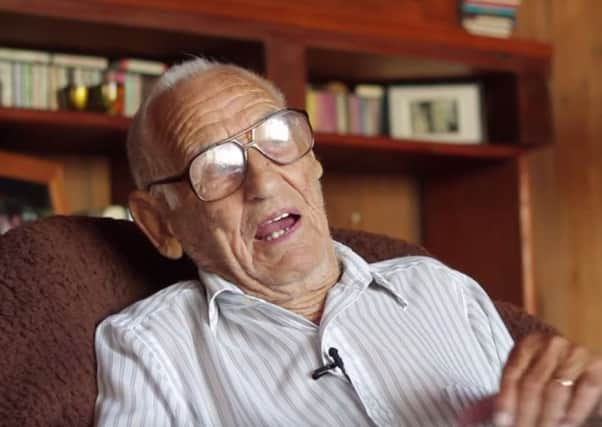Obituary: Delmer Berg, last survivor Of Abraham Lincoln Brigade


Delmer Berg who has died aged 100 was the last known surviving member of the Abraham Lincoln Brigade,the American constituent of the International Brigades which fought Franco in the Spanish Civil War. In July 1936, Franco staged a coup against the democratically elected government and,despite an international Non Intervention agreement, soon began to receive crucial support from Hitler and Mussolini, which would continue throughout the conflict.
This led to about 40,000 volunteers from some 50 countries worldwide flocking to Spain to form the International Brigades in the fight against fascism. About 500 went from Scotland of whom almost 100 were killed.
Advertisement
Hide AdAdvertisement
Hide AdInitially Berg volunteered with a medical aid agency which supported the Spanish government with medical supplies but did not send personnel to Spain. One day in late 1937 having finished his shift as dishwasher in the Roosevelt restaurant in Hollywood, he saw a Young Communist League billboard advertising for recruits to join the International Brigades in Spain. He enlisted there and then. As he explained in an interview months before his death,’I was a worker.I was in support of the Spanish working people and I wanted to help the democratically elected government under siege by Franco.”
With his passport marked ‘Not valid for travel to Spain’,he first went by bus from Los Angeles to New York where he boarded the S.S.Champlain to sail to France. After a few days in Paris he and his colleagues travelled to Carcassonne in the south to await arrangements being made to enter Spain.
A bus then took them to the foothills of the Pyrenees where they began their crossing of the snow covered mountains on foot at night along smugglers’ routes with the aid of guides. This was hazardous not only because of the physical challenges but also because it was illegal in terms of the Non Intervention Agreement and they were liable to arrest if detected. On 15th January 1938 he made it to Figueras on the Spanish side of the border where initially Berg was assigned to an anti aircraft artillery unit. After a short time in that, he was transferred to near Barcelona where he was involved in laying communication lines between bases and the front line. Next he was deployed to Teruel where a huge offensive was being mounted by Franco in the depths of winter to capture the strategically important town.Berg later recalled ‘the appalling cold’ he and his colleagues had to endure there. After that he took part in the Battle of the Ebro before being sent to Valencia,then the ‘capital’ of the Spanish government.
There he recalled being relatively inactive as most of the communication lines had already been laid.He and colleagues enjoyed their daily allocation of a litre of wine and even managed occasional visits to the cinema. But this relatively peaceful interlude was rudely interrupted one night in August 1938. Billetted then in a monastery, Italian ‘planes bombed it while trying to hit a nearby railway station and Berg was badly injured with shrapnel wounds to his liver which required surgery. By the time his convalescence was over, the momentum in the war had swung firmly in Franco’s favour. An agreement was reached in September for international forces on both sides to be withdrawn with the result that Berg and fellow Brigaders were repatriated by the end of that year.He recalled,”I felt bad about leaving but you do what you can do.”
Berg was brought up in a poor family on a farm near Manteca, California.The onset of the Depression made their plight worse. From an early age his political instincts were fashioned by circumstance and he was soon an opponent of capitalism.He left High School early to find work to help his family,by now in Oregon. There he later joined the National Guard for a short time before buying himself out for. Shortly after that, in late 1937,he left for Spain.
On his return to the States, he was drafted into the army and saw service in the 2nd World War in an anti aircraft artillery unit in the Pacific,mostly in New Guinea. In 1942 he was discharged on medical grounds arising from his Spanish injuries. He began living near Modesto, California where he worked wherever he could,mostly doing farm work and landscaping for about twenty years till he and a son started their own cement and stonemasonry business.
In 1943 he had joined the American Communist Party,influenced by his life experiences and the extent of Russia’s losses during the war. He became an activist involved in a number of causes- he organised farm workers and campaigned for improvement in their conditions,once being chosen to give evidence on the subject to a congressional hearing in Washington DC; became Vice President of his area’s NAACP branch[National Association for the Advancement of Coloured People],the only white member of their board, and engaged vigorously in the fight against racism and particularly against discrimination in housing; was active in the Mexican-American Political Association;protested against nuclear weapons and the Vietnam war;was a peace and justice committee member of the Congress of California Seniors and ten years ago his local group awarded him a plaque for ‘his lifetime dedication to Peace and Justice.’
Latterly he lived comfortably and happily with his wife June in the house he himself built in the foothills of the Sierra Nevada near Columbia. Two years ago when asked about his proudest moments after Spain,he replied,”When I was elected vice president of NAACP and when my grandson at his High School graduation said that I was his inspiration.”
Advertisement
Hide AdAdvertisement
Hide AdAlthough ultimately the International Brigades’ cause failed it was nonetheless a glorious failure. As Hemingway wrote,”No nobler men entered the Spanish earth than the members of the International Brigades.”